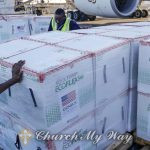Survey says: Churches could do more on identifying and using spiritual gifts
Survey says: Churches could do more on identifying and using spiritual gifts
Churches must be more determined and creative in helping Christians identify and use their spiritual gifts, according to a new survey affirmed by the observations of congregational health experts.
Churches must be more determined and creative in helping Christians identify and use their spiritual gifts, according to a new survey affirmed by the observations of congregational health experts.
Many local congregations “have a gap to fill when it comes to identifying and developing the gifts of others,” Barna Research said in reporting on a recent study it conducted in partnership with Lutheran Hour Ministries.
According to an of the research, congregations ranked below family and social circles, people with similar interests and work and school as settings where personal gifts are most commonly noticed. Only a third of self-identified Christians said church leaders invest in their spiritual gifts.
“We have to do better,” said Ircel Harrison, coaching coordinator for Pinnacle Leadership Associates and a member of First Baptist Church in Murfreesboro, Tenn.
It’s especially important that churches provide young adults with guidance finding and honing their giftedness, he said. “They are much more willing to be engaged in church when you help them find where they can serve and give them something to do.”


Joel Snider
And it’s not really all that complicated for churches to learn the callings and gifts within their own ranks, said Joel Snider, a congregational coach with the Center for Healthy Churches and former pastor of First Baptist Church in Rome, Ga.
“Why not simply ask, ‘What do you do best?’ and ‘What are some ways you could do what you do best for Christ and the kingdom?’” he said. “Start with believers and empower their desire to serve out of giftedness instead of starting with the church’s need for volunteers.”
The need for church innovation in cultivating spiritual gifts is evident in results of the Barna survey, which found only 18% of all adults and 50% of practicing Christians already familiar with their gifts described church as a place where their talents are “most commonly noticed by others.”
By comparison, 68% of adults and 70% of practicing Christians said their gifts are most often recognized by friends or family.
While churches may not excel at calling out giftedness, the issue is important to Americans.
Among self-identified Christians, 82% agreed with the statement, “As I grow my gifts, I find I also grow in my closeness to God,” including 38% who strongly agreed. Among practicing Christians — those who attended church a least once in the month prior to answering the survey — the number was 97%, including 62% who strongly agreed.


Barna also found that pastors overwhelmingly agree that spiritual gifts reflect God’s purpose but have only a moderate sense of those talents within their own churches.
“Overall, four out of five pastors also agree to some extent that helping people discover and develop their giftings is an important priority in their church. Nearly nine in 10 agree at least somewhat that helping people deploy, explore or practice generosity with their gifts is a priority of their church community.”
But the percentages are tempered by examining those who “strongly agree” in other categories, Barna noted.
Those include the 24% who strongly agreed their churches celebrate members’ giftings and how those “make a difference in our church,” the survey found. And 16% of pastors strongly agreed to having “a good sense of the giftings in our congregation.”
“In general, churches seem slow to celebrate the impact of individuals’ skills and gifts, especially when they are used outside of the church building.”
“When it comes to how individuals’ skills are put into action within a local church context, a slight majority of pastors — just over half (54%) — believes that congregants’ giftings should define how they show up in church ministry. In general, churches seem slow to celebrate the impact of individuals’ skills and gifts, especially when they are used outside of the church building (17% ‘strongly’ agree, 44% ‘somewhat’).”
Churches often struggle with too much focus on clergy gifts and too little on those of the congregation, Rick Warren, author and senior pastor at Saddleback Church, said in an article published by .
“It’s the natural tendency of leaders to emphasize what they feel strongly about and neglect whatever they feel less passionate about,” Warren wrote. “Around the world you can find churches that have become the extension of their pastor’s giftedness. They focus only on what he cares about most.”
That focus must be brought into equilibrium with discipleship, fellowship, worship, ministry, evangelism and discipleship, he explained.
“Unless you set up a system and structure to intentionally balance the five purposes, your church will tend to overemphasize the purpose that best expresses the gifts and passion of its pastor.”
Related articles:
| Opinion by Molly Marshall
| Opinion by Bill Leonard



